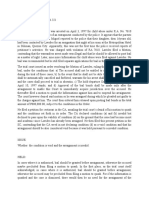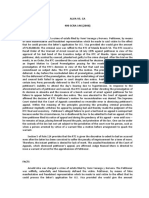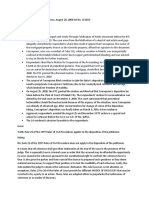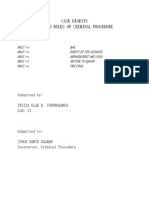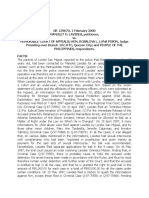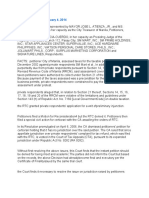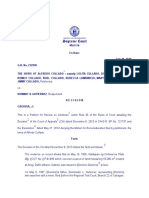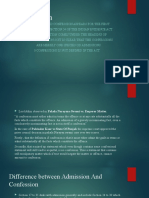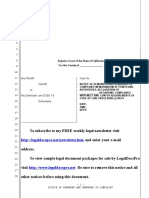Crim Pro #2 Bail
Crim Pro #2 Bail
Uploaded by
Jan Kenrick SagumCopyright:
Available Formats
Crim Pro #2 Bail
Crim Pro #2 Bail
Uploaded by
Jan Kenrick SagumOriginal Title
Copyright
Available Formats
Share this document
Did you find this document useful?
Is this content inappropriate?
Copyright:
Available Formats
Crim Pro #2 Bail
Crim Pro #2 Bail
Uploaded by
Jan Kenrick SagumCopyright:
Available Formats
2. G.R. No.
129670 February 1, 2000
MANOLET O. LAVIDES vs. HONORABLE COURT OF APPEALS; HON. ROSALINA
L. LUNA PISON, Judge Presiding over Branch 107, RTC, Quezon City; and
PEOPLE OF THE PHILIPPINES
FACTS:
Manolet Lavides was arrested without a warrant as a result of an entrapment conducted
by the police. It appears that the parents of complainant Lorelie San Miguel reported to
the police that their daughter, then 16years old, had been contacted by Lavides for an
assignation that night at his room at the Metropolitan Hotel in Diliman, Quezon City.
Apparently, this was not the first time the police received reports of petitioner’s activities.
He was charged with violation of RA 7610. Lavides filed a Motion, contending that the
warrantless arrest made was illegal and that he should be allowed to post bail as a
matter of right. Later, nine more Informations for child abuse were filed against Lavides.
No bail was recommended but he still filed separate applications for bail in the nine
cases.
The trial court issued an order resolving the Motion of Lavides, ruling that he is allowed
to post bail, under the conditions that: a) The accused shall not be entitled to a waiver of
appearance during the trial of these cases; b) In the event that he shall not be able to do
so, his bail bonds shall be automatically cancelled and forfeited, warrants for his arrest
shall be immediately issued and the cases shall proceed to trial in absentia; c) The hold-
departure Order of this Court dated April 10, 1997 stands; and d) Approval of the bail
bonds shall be made only after the arraignment to enable this Court to immediately
acquire jurisdiction over the accused. He thereafter filed a motion to quash the
Informations against him and to suspend his arraignment. The court however denied
said motion so he was arraigned during which he pleaded not guilty to the charges
against him. The court then ordered him released upon posting bail bonds in the total
amount of P800,000.00, subject to the conditions in the Order.
He filed a petition for certiorari in the CA, assailing the trial court’s denial of his motion to
quash and the conditions set forth in its order. The CA declared conditions (a) and (b)
invalid but declined to pass upon the validity of condition (d) on the ground that the
issue had become moot and academic since Lavides has already been arraigned. He
then filed this present petition in the SC, contending that the CA erred in not declaring
condition (d) as a void condition and that his arraignment should be also considered
void because it was held pursuant to a invalid condition.
ISSUE:
Whether or not the condition is void and the arraignment is invalid.
RULING:
The condition is void. Bail should be granted before arraignment, otherwise the accused
may be precluded from filing a motion to quash. For if the information is quashed and
the case is dismissed, there would then be no need for the arraignment of the accused.
In the second place, the trial court could ensure the presence of petitioner at the
arraignment precisely by granting bail and ordering his presence at any stage of the
proceedings, such as arraignment. To condition the grant of bail to an accused on his
arraignment would be to place him in a position where he has to choose between (1)
filing a motion to quash and thus delay his release on bail because until his motion to
quash can be resolved, his arraignment cannot be held, and (2) foregoing the filing of a
motion to quash so that he can be arraigned at once and thereafter be released on bail.
These scenarios certainly undermine the accused’s constitutional right not to be put on
trial except upon valid complaint or information sufficient to charge him with a crime and
his right to bail.
You might also like
- Bar Exam Questions On Preliminary AttachmentDocument20 pagesBar Exam Questions On Preliminary AttachmentKim Ecarma100% (2)
- Manantan Vs CADocument6 pagesManantan Vs CAJom Eugene JambonganaNo ratings yet
- Lavises V CA 324 SCRA 321Document2 pagesLavises V CA 324 SCRA 321Larry Fritz SignabonNo ratings yet
- 2 Lavides V CADocument2 pages2 Lavides V CAAleli BucuNo ratings yet
- Lavides v. CADocument1 pageLavides v. CASteve AmbalongNo ratings yet
- Lavides v. CADocument3 pagesLavides v. CAKim RamosNo ratings yet
- Lavides v. CA DigestDocument11 pagesLavides v. CA DigestShergina AlicandoNo ratings yet
- 2 114 3.lavides vs. CA, G.R. No.129670, February 1, 2000Document4 pages2 114 3.lavides vs. CA, G.R. No.129670, February 1, 2000cdpong cornjiNo ratings yet
- Lavides v. CA 2000Document3 pagesLavides v. CA 2000MarianneVitug0% (1)
- Lavides V CADocument1 pageLavides V CADan Marco GriarteNo ratings yet
- DUE PROCESS To JURIS OF SB Crimpro CapellanDocument53 pagesDUE PROCESS To JURIS OF SB Crimpro Capellanpepper6449No ratings yet
- Lavides V CA G.R. No. 129670. February 1, 2000Document5 pagesLavides V CA G.R. No. 129670. February 1, 2000MWinbee VisitacionNo ratings yet
- PART VII - BAIL (Rule 114)Document88 pagesPART VII - BAIL (Rule 114)Naomi NodadoNo ratings yet
- Alva VS Ca - AbordoDocument5 pagesAlva VS Ca - AbordoshariabordoNo ratings yet
- Lavides v. Court of AppealsDocument1 pageLavides v. Court of AppealsKienNo ratings yet
- Philippine American Life vs. BrevaDocument6 pagesPhilippine American Life vs. BrevaSyElfredGNo ratings yet
- Case Digest 1 7 Crim ProDocument9 pagesCase Digest 1 7 Crim ProMelanie Graile TumaydanNo ratings yet
- LAVIDES vs. CADocument6 pagesLAVIDES vs. CABiaNo ratings yet
- Lavides Vs Ca GR 129670 01feb00Document7 pagesLavides Vs Ca GR 129670 01feb00Batmanrobin Robinbatman0% (1)
- 1.manolet O. LavidesDocument2 pages1.manolet O. LavidesEzra Joy CanosaNo ratings yet
- De Leon v. Court of Appeals G.R. No. 138884 June 6, 2002Document2 pagesDe Leon v. Court of Appeals G.R. No. 138884 June 6, 2002Mharey AlmachaNo ratings yet
- Labides Vs CADocument16 pagesLabides Vs CAEunice NavarroNo ratings yet
- Gandarosa-vs-Flores-and-PeopleDocument3 pagesGandarosa-vs-Flores-and-PeopleKen BocsNo ratings yet
- Lavides vs. CADocument8 pagesLavides vs. CAPanday L. MasonNo ratings yet
- 23 Lozada-Cerezo Vs PeopleDocument1 page23 Lozada-Cerezo Vs Peopledenxolozada100% (1)
- Rule 57. Adlawan V TorresDocument2 pagesRule 57. Adlawan V Torres.No ratings yet
- Case DigestDocument10 pagesCase DigestNicole PaaNo ratings yet
- 4 VotesDocument3 pages4 VotesedcaratsNo ratings yet
- Chua Vs CADocument4 pagesChua Vs CAEva TrinidadNo ratings yet
- Rule 15 19 Case DigestDocument40 pagesRule 15 19 Case DigestAnonymous r1cRm7FNo ratings yet
- Petitioner Vs Vs Respondents: Second DivisionDocument5 pagesPetitioner Vs Vs Respondents: Second DivisionIrish OliverNo ratings yet
- Gandarosa vs. Flores and PeopleDocument3 pagesGandarosa vs. Flores and PeopleTeoti Navarro Reyes100% (1)
- Concepcion de Manguerra V RisosDocument2 pagesConcepcion de Manguerra V Risosiezner1No ratings yet
- G.R. No. 191015Document14 pagesG.R. No. 191015Abby EvangelistaNo ratings yet
- Rule 114 Digest Group 6Document32 pagesRule 114 Digest Group 6KDNo ratings yet
- CP DigestDocument5 pagesCP DigestCyrus Santos MendozaNo ratings yet
- Evi Case Digest MakiDocument9 pagesEvi Case Digest MakimakicanibanNo ratings yet
- CP-061 Lavides v. CADocument2 pagesCP-061 Lavides v. CANARAG LAW OFFICENo ratings yet
- Case 16-20Document5 pagesCase 16-20Nikai SanchezNo ratings yet
- Acbang v. LopezDocument3 pagesAcbang v. Lopezcsalipio24No ratings yet
- People v. ObsaniaDocument17 pagesPeople v. ObsaniaCases M7No ratings yet
- Lavi DesDocument2 pagesLavi DesimXinYNo ratings yet
- Crim Pro Digest On SquashDocument24 pagesCrim Pro Digest On Squashjoseph1294No ratings yet
- Crimpro DigestDocument5 pagesCrimpro DigestCaseyNo ratings yet
- Spouses Bautista v. SulaDocument3 pagesSpouses Bautista v. SulaMaria AnalynNo ratings yet
- Case Digests UpdatedDocument4 pagesCase Digests UpdatedkontributeNo ratings yet
- 3 - Aguinaldo X SalappudinDocument5 pages3 - Aguinaldo X SalappudinCelestino LawNo ratings yet
- BailDocument21 pagesBailVanillaSkyIIINo ratings yet
- First 5 HabeasDocument9 pagesFirst 5 HabeasOlivia FelNo ratings yet
- Landingan vs. CA DigestDocument2 pagesLandingan vs. CA DigestkathrynmaydevezaNo ratings yet
- Alva vs. CA (Case Digest)Document2 pagesAlva vs. CA (Case Digest)Cherie Teves67% (3)
- De Lima V GuerreroDocument3 pagesDe Lima V Guerrerokarl doceoNo ratings yet
- (Comelec v. de La Victoria) (Serapio) c2021Document1 page(Comelec v. de La Victoria) (Serapio) c2021itsmestephNo ratings yet
- Benares v. LimDocument6 pagesBenares v. LimSiegfred G. Perez100% (1)
- Chua Vs CaDocument2 pagesChua Vs CaSteve NapalitNo ratings yet
- 6 People vs. CelesteDocument5 pages6 People vs. CelesteFrancis Leo TianeroNo ratings yet
- Lavides vs. CADocument3 pagesLavides vs. CAMaestro Lazaro100% (2)
- 01 Serapio v. SandiganbayanDocument3 pages01 Serapio v. SandiganbayanErwinRommelC.FuentesNo ratings yet
- 1-4 Rule 114 Part 1Document3 pages1-4 Rule 114 Part 1Eunice SerneoNo ratings yet
- California Supreme Court Petition: S173448 – Denied Without OpinionFrom EverandCalifornia Supreme Court Petition: S173448 – Denied Without OpinionRating: 4 out of 5 stars4/5 (1)
- U.S. v. Sun Myung Moon 532 F.Supp. 1360 (1982)From EverandU.S. v. Sun Myung Moon 532 F.Supp. 1360 (1982)No ratings yet
- Incident Report: Evangeline M. GutierrezDocument1 pageIncident Report: Evangeline M. GutierrezJan Kenrick SagumNo ratings yet
- Ms. Ella SantosDocument1 pageMs. Ella SantosJan Kenrick SagumNo ratings yet
- Resolution No. 2019 406Document3 pagesResolution No. 2019 406Jan Kenrick SagumNo ratings yet
- Affidavit of One of The Same Person - GM BankDocument2 pagesAffidavit of One of The Same Person - GM BankJan Kenrick SagumNo ratings yet
- Affidavit of Two Disinterested Persons - GM BankDocument2 pagesAffidavit of Two Disinterested Persons - GM BankJan Kenrick SagumNo ratings yet
- Caluag vs. PecsonDocument10 pagesCaluag vs. PecsonJan Kenrick SagumNo ratings yet
- Affidavit of One of The Same PersonDocument2 pagesAffidavit of One of The Same PersonJan Kenrick SagumNo ratings yet
- Affidavit of Heirship 1Document2 pagesAffidavit of Heirship 1Jan Kenrick SagumNo ratings yet
- Judicial Affidavit Final DraftDocument10 pagesJudicial Affidavit Final DraftJan Kenrick Sagum100% (1)
- State Witness Case ResearchDocument69 pagesState Witness Case ResearchJan Kenrick SagumNo ratings yet
- Daily Time Record Sagum, Jan Kenrick Z. Daily Time Record Sagum, Jan Kenrick ZDocument1 pageDaily Time Record Sagum, Jan Kenrick Z. Daily Time Record Sagum, Jan Kenrick ZJan Kenrick SagumNo ratings yet
- Affidavit (Property Settlement)Document3 pagesAffidavit (Property Settlement)Jan Kenrick SagumNo ratings yet
- Memorandum of AgreementDocument2 pagesMemorandum of AgreementJan Kenrick SagumNo ratings yet
- Civpro Fin Cases WK1Document39 pagesCivpro Fin Cases WK1Jan Kenrick SagumNo ratings yet
- Historical and Literary Highlights: Darangen (Maranao) Hudhud (Ifugao) and Ulahingan (Manobo) - These Epics RevolveDocument5 pagesHistorical and Literary Highlights: Darangen (Maranao) Hudhud (Ifugao) and Ulahingan (Manobo) - These Epics RevolveJan Kenrick SagumNo ratings yet
- Republic Vs Diaz (Payment of Just Comp. in Recovery of Possession)Document8 pagesRepublic Vs Diaz (Payment of Just Comp. in Recovery of Possession)Jan Kenrick SagumNo ratings yet
- The Probation of Offenders Ordinance, 1960Document10 pagesThe Probation of Offenders Ordinance, 1960Arman HbibNo ratings yet
- People vs. PangilinanDocument6 pagesPeople vs. PangilinanMae Clare BendoNo ratings yet
- Matriculation Exam Guide For Criminal Procedure in Uganda by Lubogo First Edition TRDocument221 pagesMatriculation Exam Guide For Criminal Procedure in Uganda by Lubogo First Edition TRlubogoNo ratings yet
- United States v. Bailey, 4th Cir. (2000)Document15 pagesUnited States v. Bailey, 4th Cir. (2000)Scribd Government DocsNo ratings yet
- Cullado V GutierrezDocument16 pagesCullado V GutierrezMara ClaraNo ratings yet
- Sample Motion To Expunge Lis Pendens For CaliforniaDocument3 pagesSample Motion To Expunge Lis Pendens For CaliforniaStan Burman100% (4)
- Law GAT Sample 4Document11 pagesLaw GAT Sample 4Homanam SisvyNo ratings yet
- Evidence Case DigestDocument55 pagesEvidence Case DigestMae TrabajoNo ratings yet
- ConfessionDocument9 pagesConfessionSatwant SinghNo ratings yet
- Elon Musk X Vs Media MattersDocument16 pagesElon Musk X Vs Media MattersSimon AlvarezNo ratings yet
- (CPR) Abelita Vs Doria, GR No 170672, 14 August 2009 Case DigestDocument2 pages(CPR) Abelita Vs Doria, GR No 170672, 14 August 2009 Case Digestarceo.ezekiel0No ratings yet
- Sample Demurrer To Fraud Complaint For CaliforniaDocument5 pagesSample Demurrer To Fraud Complaint For CaliforniaStan Burman100% (2)
- James Huntsman's Opposition To Church MotionDocument23 pagesJames Huntsman's Opposition To Church MotionThe Salt Lake TribuneNo ratings yet
- Silva Vs CA, GonzalesDocument2 pagesSilva Vs CA, GonzalesElvis Jagger Abdul JabharNo ratings yet
- Vignana Jyothi Institute of Management Labour Law-I: Assignment-3Document7 pagesVignana Jyothi Institute of Management Labour Law-I: Assignment-3Varsha KandalaNo ratings yet
- Fitness of The Victim Should Be ExaminedDocument4 pagesFitness of The Victim Should Be ExaminedAditya Prakash Verma100% (1)
- Index Card FormatDocument4 pagesIndex Card FormatThea PorrasNo ratings yet
- Motion To Set Case HearingDocument5 pagesMotion To Set Case HearingMarc Christian H. TangpuzNo ratings yet
- Makati Tuscany Condominium v. Multi-Realty Development Corporation, G.R. No. 185530, April 18, 2018Document24 pagesMakati Tuscany Condominium v. Multi-Realty Development Corporation, G.R. No. 185530, April 18, 2018Kate Del PradoNo ratings yet
- People of The Philippines Versus Renerio P. Vergara, Ernesto T. Cuesta JR., Pedro G. Dagao and Bernardo P. Cuesta, G.R. No. 110286, April 2, 1997Document2 pagesPeople of The Philippines Versus Renerio P. Vergara, Ernesto T. Cuesta JR., Pedro G. Dagao and Bernardo P. Cuesta, G.R. No. 110286, April 2, 1997Anonymous ubixYANo ratings yet
- Shukur Ali Case Website Summary PDFDocument2 pagesShukur Ali Case Website Summary PDFShohan SumonNo ratings yet
- Stolt-Nielsen v. Medequillo, January 18, 2011Document15 pagesStolt-Nielsen v. Medequillo, January 18, 2011bentley CobyNo ratings yet
- 2021 36 15 30639 Order 07-Oct-2021Document6 pages2021 36 15 30639 Order 07-Oct-2021Tejas PopatNo ratings yet
- Reeves v. Ratliff Et Al - Document No. 3Document7 pagesReeves v. Ratliff Et Al - Document No. 3Justia.comNo ratings yet
- 14-01-06 Motorola Mobility Reply Brief in Appeal of Wisconsin FRAND DismissalDocument12 pages14-01-06 Motorola Mobility Reply Brief in Appeal of Wisconsin FRAND DismissalFlorian MuellerNo ratings yet
- De Leon v. Dela LlanaDocument2 pagesDe Leon v. Dela LlanaAnonymous 5MiN6I78I0100% (1)
- BarOps 3rd SetDocument30 pagesBarOps 3rd SetVeah CaabayNo ratings yet
- RURAL BANK OF LUCENA Vs HON ARCA DigestDocument2 pagesRURAL BANK OF LUCENA Vs HON ARCA DigestSu Kings Abeto100% (1)
- People of The Philippines Vs CabreraDocument17 pagesPeople of The Philippines Vs CabreraCharity Joy Manayod LemieuxNo ratings yet


